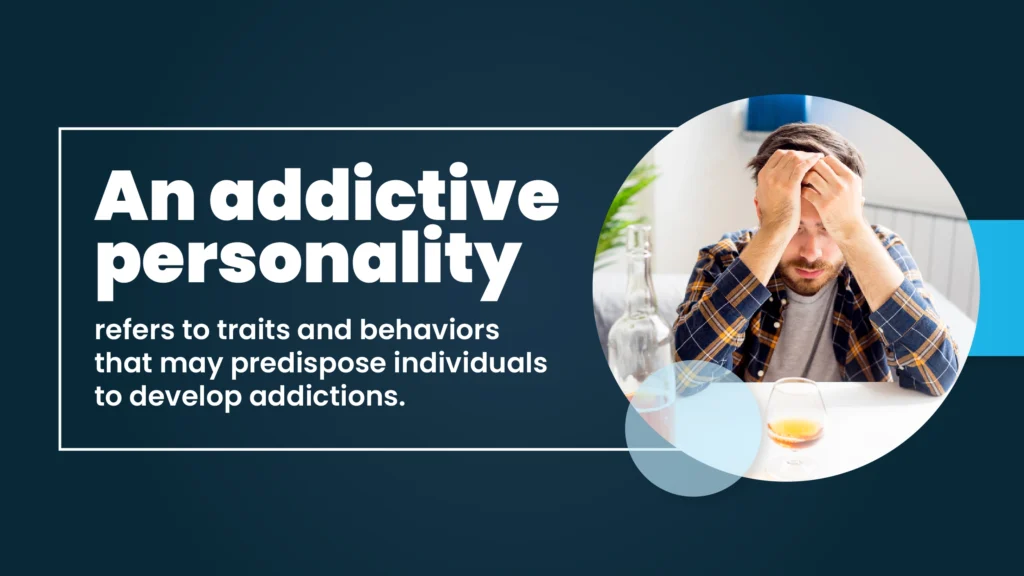An addictive personality refers to a cluster of traits, behaviors, and tendencies that make some individuals more susceptible to developing addictive behaviors and dependencies. But is it a genuine psychological trait predisposing individuals to addiction, or is it a simplistic myth that oversimplifies the complex nature of substance abuse and behavioral dependencies?
Understanding the concept of an addictive personality can help tailor prevention and treatment strategies for addiction, focusing on addressing underlying factors and promoting healthier coping mechanisms.

Key Takeaways
Seeking professional help and support is crucial for individuals with addictive tendencies to manage their behaviors and reduce their risk of addiction. Here’s what you need to know:
- An addictive personality refers to traits and behaviors that may predispose individuals to develop addictions.
- A tendency toward impulsivity, seeking instant gratification, and difficulty in regulating emotions make individuals more prone to addiction-related challenges.
- Addiction is multifaceted. No single personality trait or factor can fully explain why some individuals become addicted while others do not.
Contact The Haven Detox-South Florida at (561) 328-8627 for personalized assistance to achieve long-term sobriety and growth.
Addiction Explained
Addiction is a complex and multifaceted phenomenon affecting millions worldwide, transcending geographical, cultural, and socioeconomic boundaries. It can be broadly categorized into two main types, as discussed below.
Substance Addiction
Substance addiction, often referred to as substance use disorder, involves the compulsive and harmful use of substances such as drugs or alcohol. Individuals who grapple with substance addiction may develop a physical and psychological dependence on these substances, leading to a loss of control over their consumption.
Common examples include addiction to opioids, cocaine, nicotine, and alcohol. The brain’s reward system plays a significant role in substance addiction, as these substances often trigger the release of dopamine, a neurotransmitter associated with pleasure and reward.
Over time, individuals may require increasing amounts of the substance to achieve the desired effect, leading to a vicious cycle of addiction.
Behavioral Addiction
Behavioral addiction, or process addiction, is characterized by an individual’s compulsive engagement in specific behaviors that provide a pleasurable experience despite negative consequences. Common examples include gambling addiction, internet and social media addiction, gaming addiction, and shopping addiction.
These behaviors can activate the brain’s reward pathways like substances, leading to cravings and losing control. The consequences of behavioral addiction can be far-reaching, affecting one’s mental health, relationships, and overall quality of life.
Addictive Personality Explained
An addictive personality refers to traits and behaviors that increase the likelihood of developing addictions. These traits often include impulsivity, sensation-seeking, and prioritizing short-term pleasure over long-term consequences.
People with addictive personalities may find it challenging to control their impulses, leading to excessive engagement in activities like substance abuse, gambling, or compulsive eating. Genetic factors can contribute to this predisposition and environmental influences like early exposure to addictive substances.
While not everyone with these traits develops an addiction, recognizing them can help individuals take proactive steps to manage their behavior and seek support if needed to avoid potential pitfalls.
Personality Traits Associated with Addictive Behaviors
Various personality traits and psychological factors can influence addictive behaviors. Personality traits alone do not determine addiction but can affect an individual’s susceptibility to addictive behaviors.
Here are some personality traits that are often associated with addictive behaviors:
Thrill-Seeking
One prominent personality trait often associated with impulsive behaviors is thrill-seeking. Individuals with high thrill-seeking tendencies tend to engage in risky and impulsive activities like substance abuse or gambling.
They crave the excitement and adrenaline rush that these risk-taking behaviors provide. This innate desire for novelty and excitement can lead them toward drug abuse as they continuously seek new highs to satisfy their cravings.
Impulsivity and Mood Swings
Impulsivity is another personality trait closely linked to addictive behaviors. Those who struggle with impulse control find it challenging to resist immediate gratification, making them susceptible to addiction.
This impulsivity often manifests in impulsive substance use or compulsive gambling, as individuals act on their cravings without considering the long-term consequences. Furthermore, mood swings, characteristic of many addictive personalities, contribute to the cycle of addiction.
Fluctuating emotional states can lead individuals to self-medicate with addictive substances or unhealthy ways, hoping to alleviate emotional discomfort.
Low Self-Esteem
Low self-esteem can fuel addictive behaviors. Individuals with low self-esteem often use substances or engage in addictive activities as a coping mechanism to escape feelings of inadequacy or self-doubt.
The temporary confidence or relief they experience when under the influence becomes a reinforcing cycle, trapping them in an addictive pattern. Addressing underlying self-esteem issues is crucial in breaking this cycle and promoting healthier coping strategies.
Role of Mental Health in Addiction Development
Mental health plays a significant role in the development and progression of addiction. Let’s explore some of the ways mental health and addiction interact:
- Self-Medication: Individuals with untreated or undiagnosed mental health conditions may use drugs or alcohol to self-medicate. They use substances to alleviate symptoms such as anxiety, depression, or trauma. This can lead to a cycle of dependence and addiction.
- Co-Occurring Disorders (Dual Diagnosis): Many people struggling with addiction also have co-occurring mental health disorders, such as depression, anxiety, bipolar disorder, or post-traumatic stress disorder (PTSD). These conditions can exacerbate substance abuse and vice versa. It can be challenging to address one without addressing the other.
- Escapism: Individuals with poor mental health may use drugs or alcohol to escape the emotional pain or stress they’re experiencing. This temporary relief can create a powerful incentive to continue using substances, even when causing harm.
- Cravings and Triggers: Mental health issues can trigger cravings for substances. For example, someone with social anxiety may be more tempted to drink alcohol at social events to ease their discomfort. Stress, trauma, and emotional triggers can also increase the risk of relapse.
- Stigmatization and Isolation: The stigma associated with mental health issues and addiction can lead to shame and isolation. This can deter individuals from seeking help, exacerbating their mental health and addiction problems.
- Treatment Challenges: Treating addiction in the presence of mental health issues can be more complex. Integrated treatment approaches that address both conditions simultaneously tend to be more effective in promoting long-term recovery.
- Relapse Risk: Individuals with mental health issues may be at a higher risk of relapse because they may struggle with the underlying emotional triggers and challenges even after achieving initial sobriety.
Is Addictive Personality Real?
The concept of an “addictive personality” is somewhat controversial in psychology and addiction studies. It’s not considered a formal personality disorder or a universally accepted concept. Instead, it’s often used informally to describe certain personality traits, behaviors, or tendencies that some believe may make individuals more susceptible to addiction.
There are many different theories and models of addiction that emphasize different aspects of the condition. Some focus on genes and biological factors, while others highlight the role of psychological and environmental factors.
Ultimately, the development and treatment of addiction are multifaceted, and no single personality trait or factor can fully explain why some individuals become addicted while others do not. It’s also important to emphasize that addiction is not a life sentence, and change is possible.
People with substance use disorders or behavioral addictions can seek help and engage in treatment programs that can be effective in helping them overcome their addiction and lead healthier lives. The idea that change is possible is a fundamental addiction treatment and recovery principle.
Mental Health Interventions for Addiction
Mental health interventions are crucial in addressing addiction because substance abuse often co-occurs with mental health disorders. This comorbidity is known as dual diagnosis or co-occurring disorders. Effective mental health interventions for addiction typically involve a combination of therapeutic approaches tailored to the individual’s specific needs.
Here are some common interventions to achieve recovery:
Cognitive-Behavioral Therapy (CBT)
Cognitive-behavioral therapy (CBT) is a widely recognized and effective approach to mental health interventions for addiction. This evidence-based therapy focuses on identifying and altering the thought patterns and behaviors contributing to addiction.
In CBT, individuals learn to recognize triggers, negative thought processes, and maladaptive behaviors associated with substance abuse. Through various techniques, they develop coping strategies and problem-solving skills to manage cravings and stressors that often lead to relapse.
CBT helps individuals reframe their perceptions and establish healthier ways of responding to challenging situations, ultimately promoting long-term recovery.
Dialectical-Behavioral Therapy
Dialectical-Behavioral Therapy (DBT) is another valuable intervention for drug problems, particularly for individuals with co-occurring mental health issues like borderline personality disorder. DBT combines cognitive-behavioral techniques with mindfulness and acceptance strategies.
It teaches individuals how to regulate emotions, improve interpersonal skills, and tolerate distress without substance use. DBT’s emphasis on self-acceptance and mindfulness helps individuals become more aware of their cravings and triggers, enabling them to respond more adaptively.
Group Therapy
Group therapy is a crucial component of mental health interventions for addiction. It provides a supportive and nonjudgmental environment where individuals with similar struggles can share their experiences, offer encouragement, and learn from one another.
Group therapy fosters a sense of community and belonging, reducing feelings of isolation often accompanying addiction. It also helps individuals develop essential social skills and relapse prevention techniques.
Additionally, group therapy can be a powerful accountability mechanism, as members hold each other responsible for their recovery goals.
Frequently Asked Questions (FAQ)
How do you know if you have an addictive personality?
You might have an addictive personality disorder if you frequently struggle to control impulses, engage in excessive and compulsive behaviors, and find it challenging to moderate substance use or certain activities.
If these patterns negatively impact your life, relationships, or well-being, consider seeking professional help from experts or counseling to understand better and manage your addictive personality traits.
What characterizes addictive behavior?
Addictive behavior is marked by repetitive engagement in activities or substance use despite adverse consequences. It often includes an increasing tolerance, withdrawal symptoms when not engaged, and neglecting responsibilities or relationships.
Individuals with addictive behavior may prioritize the addictive substance or activity over other aspects of life, making it challenging to quit or control. Treatment and support are essential for breaking these patterns.
What is the root cause of an addictive personality?
The root cause of an addictive personality is complex and not fully understood. It likely involves a combination of genetic, environmental, and psychological factors. Genetics can play a role in vulnerability, while childhood experiences, trauma, and mental health issues can contribute.
Social influences and peer pressure also play a significant role. Overall, a multifaceted interplay of these elements contributes to the development of addictive tendencies in some individuals.
Beat Addiction at The Haven Detox-South Florida
Our comprehensive detox program clears your body of drugs and alcohol, while our residential program offers the support you need for long-term healing.
In addition, Our SMART Recovery approach dives deep into the triggers and underlying issues that lead individuals to addiction. Our team of experienced therapists collaborates closely with you to cultivate effective and healthy coping mechanisms, breaking free from the cycle of destructive patterns.
Call us at (561) 328-8627 to rediscover a life filled with purpose and joy.






